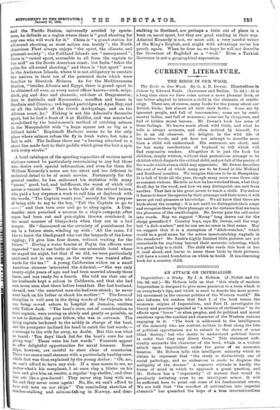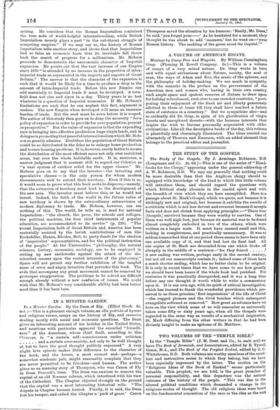AN ATTACK ON IMPERIALISM.
Imperialism : a Study. By J. A. Hobson. (J. Nisbet and Co. 10s. 6d. net.)—Mr. Hobson tells us that "this study of modern Imperialism is designed to give more precision to a term which is on everybody's lips, and which is used to denote the most power- ful movement in the current politics of the Western world." He also informs his readers that Part I. of the book traces the economic origins of Imperialism, and Part II. investigates its theory and practice regarded as "a mission of civilisation" in its effects upon "lower" or alien peoples, and its political and moral reactions upon the conduct and character of the Western nations engaging in it. "The book is addressed to the intelligence of the minority who are content neither to float along the tide of political opportunism nor to submit to the shove of some blind destiny,' but who desire to understand political forces in order that they may direct them." This statement suffi- ciently earmarks the character of the book, which is a violent attack upon Imperialism under the guise of an economic treatise. Mr. Hobson tells this intelligent minority which he claims to represent that "the study is distinctively one of social pathology, and no endeavour is made to disguise the malignity of the disease." A superior attitude is hardly the frame of mind in which to approach a great question, and Mr. Hobson has a " superiority " of manner that would be peculiarly irritating even to an intelligent minor. It will be sufficient here to point out some of his fundamental errors. We are told that "the overflow of nationalism into imperial channels" has quenched the hope of a true internationalism
arising. He considers that the Roman Imperialism contained the true note of world-helpful internationalism, while British Imperialism merely plays a part "in the cut-throat struggle of competing empires." If we may say so, the history of Roman Imperialism tells another story, and shows that that Imperialism had so false an economic basis that its inevitable fall threw back the march of progress for a millennium. Mr. Hobson proceeds to demonstrate the uneconomic character of Imperial expansion. He points out that the vast increase of our Empire since 1870 "is attended by no increase in the proportion of intra- imperial trade as represented in the imports and exports of Great
Britain." The answer is that the character of the expansion is such that it would be likely for a time to produce a drop in the amount of intra-Imperial trade. Before this new Empire can add materially to Imperial trade it must be developed. A corn- field does not rise and ripen in a day. Thirty years is no test whatever in a question of Imperial economics. If Mr. Hobson's limitations are such that he can neglect this fact, argument is useless. The new Empire when developed will mean an immense burden of trade. But the seed must be sown before it is reaped. The author of this study then goes on to deny the necessity "for a policy of expansion in order to provide for over-population, present or prospective." But the value of expansion is that the expanding race is bringing into effective production huge virgin lands, and in doing so is pro moting that peaceful internationalism which Mr. Hob- son so greatly admires. Doubtless the population of Great Britain could be so distributed in the Isles as to enlarge home production and to cure housing problems. It is, however, surely better to secure the distribution of the most efficient races not only over restricted areas, but over the whole habitable earth. It is, moreover, a narrow judgment that is content still to regard our Colonies as "a vast system of outdoor relief for the upper classes." Mr. Hobson goes on to say that the investor—the investing and speculative classes — is the only person for whom modern Governments seek to extend their territory. Even if this is so, it would seem to prove what this book seeks to disprove,—namely, that the extension of territory must lead to the development of the new area. The investor must believe this, or he would not invest. Indeed, the faith of the world in the future value of new territory is shown by the extraordinary subservience of modern diplomacy to trade. Mr. Hobson, however, can see nothing of this. The world, he tells us, is mad for national Imperialism : "the church, the press, the schools and colleges, the political machine, the four chief instruments of popular education, are accommodated to its service" (p. 228). "The recent Imperialism both of Great Britain and America has been materially assisted by the lavish contributions of men like Rockefeller, Hanna, Rhodes, Beit, to party funds for the election of imperialist' representatives, and for the political instruction of the people." At the Universities "philosophy, the natural sciences, history, economics, sociology, are to be employed in setting up new earthworks against the attack of the dis- inherited masses upon the vested interests of the plutocracy." Space will not permit any further exhibition of the tangled mass of error and angry invective that pervades this book. The evils that accompany any great movement cannot be removed by grotesque exaggeration. The problems to be solved are difficult enough already without a new confusion of issues. We could wish that Mr. Hobson's very considerable ability had been better used than it has been here.























































 Previous page
Previous page